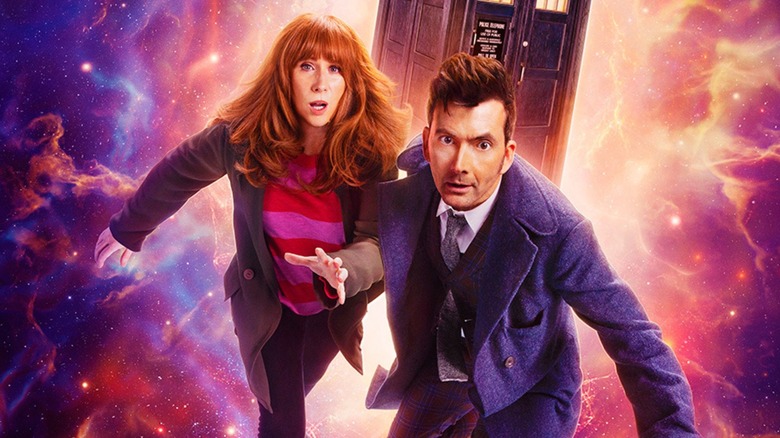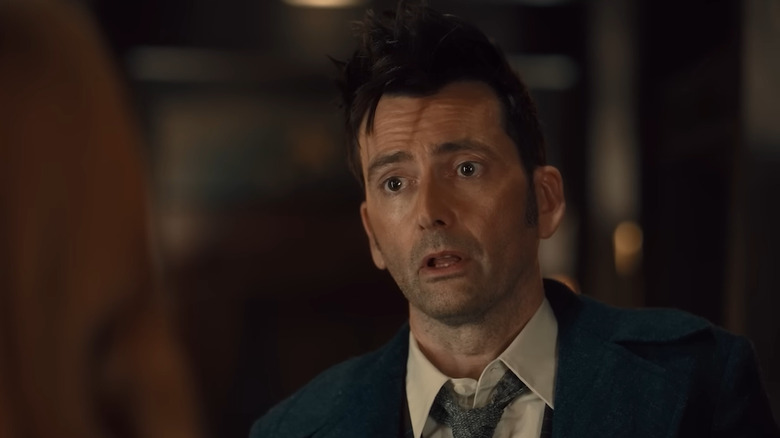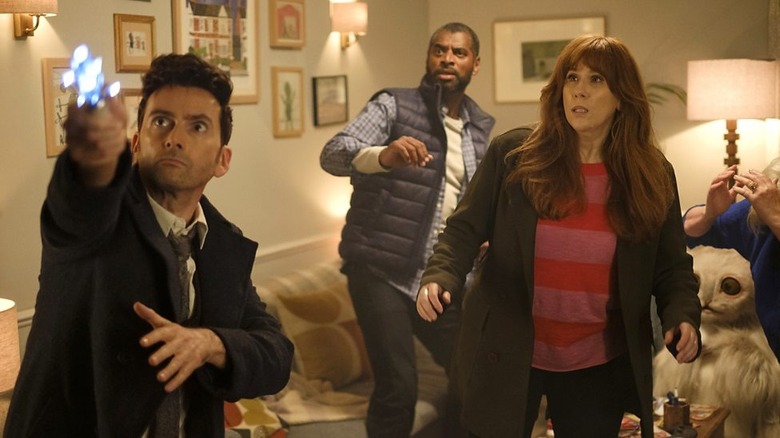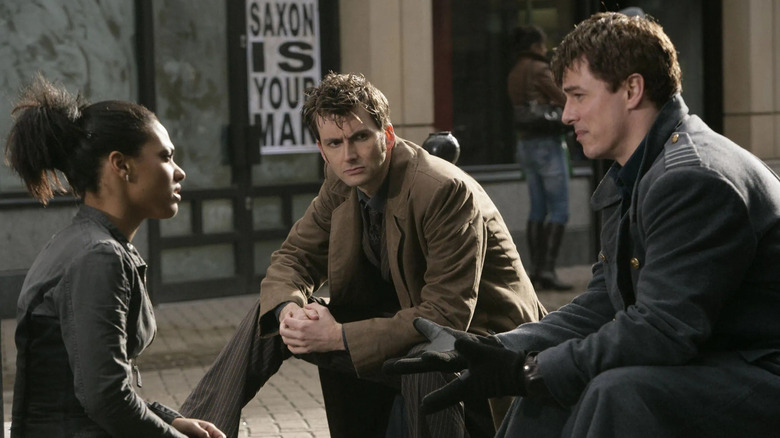The Doctor Who Special's Explanation For Bringing Donna Back Is Perfectly Stupid
Going into the first of three 60th anniversary specials for "Doctor Who," fans had a lot of questions. Why was the Doctor (David Tennant) back in the body of the 10th Doctor? What has Donna (Catherine Tate) been up to over the past thirteen years? And most importantly, how can Donna return as a companion if her memory's been wiped? In season 4's "Journey's End" and in Tennant's final two-parter, "The End of Time," it was made very clear that Donna cannot be allowed to remember anything about the Doctor, or she'll die. Yet now she's back in the Tardis not just for "The Star Beast," but for two more specials.
Well, "The Star Beast" didn't solve the mystery of the Doctor's returning face, but it did answer all our questions about Donna. Where's she been all these years? She's stayed in London, still married to Shaun Temple (Karl Collins) and now raising a 15-year-old daughter, Rose (Yasmin Finney). We find out early on that Donna chose to give away all the money she won in the lottery in "The End of Time," but it's not until the end of the episode that we're fully told the reason why: Because a little part of her did unconsciously remember the Doctor, and she thought that giving the money away to those less fortunate is what the Doctor would do.
As for Donna surviving the return of her memories and the meta-crisis that comes with it? The answer to that is a bit more complicated, and quite a lot sillier.
Fate gives the Doctor no choice
"The Star Beast" features a lot of callbacks to the Russell T. Davies era of "Doctor Who" (seasons 1 through 4), which makes sense considering this episode marks Davies' official return. He oversaw the specials and will be showrunner for the entirety of season 14, and already we've seen the series return to the many hallmarks its early seasons. Goofy aliens that are obviously just guys in costumes? Cartoonish villains that seem intentionally underdeveloped so the episode can focus more on the characters' internal journeys? Companions who live complicated, messy, working-class lives that are explored in-depth by the show? Check, check, and check.
Much like "Partners in Crime," the season 4 premiere that brought Donna and the Doctor back together the first time, the main alien in this episode is cute, cuddly, and more of an afterthought than a proper villain. It's a furry little creature called Beep the Meep, who soon reveals themself to be an evil alien planning to burn all of London to the ground. The Doctor tries to stop the Meep, but when he's cut off from half of the control room in the Meep's spaceship, the Doctor has no other way to save London than to reawaken Donna's memories. To do so would be to also reawaken the Time Lord part of her mind, bringing back the DoctorDonna meta-crisis, which her human body can't handle.
He reluctantly does it anyway. Donna gets to help the Doctor save London, but she dies from the mental overload shortly afterward. Or does she?
A wibbly wobbly explanation
So, why doesn't the DoctorDonna meta-crisis kill Donna this time around? The official answer is that she's had a child since her last appearance. "Too much power for one person — but you had a child, and the meta-crisis passed down," the Doctor explains. They're not out of the woods yet, however. A scene or two later, the Doctor explains to both Rose and Donna, "The meta-crisis might have slowed down, but that thing is wrapped around your cortex."
Luckily, Rose and Donna have already thought of a solution: They'll just "let it go." Yes, mentally letting go of the meta-crisis was indeed an option this whole time.
In the scene where this happens, Rose and Donna give a short spiel about how the "male-presenting" Doctor would never be able to think of this solution. It's something a lot of fans have already criticized as being a weirdly clunky attempt at feminism, or a strangely gender-essentialist talking point in an episode that's otherwise all about rejecting gender binaries. However, I interpreted it as an intentionally nonsensical line. It was the show poking fun at itself for how ridiculous this solution was, by giving the solution an even more ridiculous explanation. Because even if you accept that the male Doctors couldn't have figured this out, it's not like the Thirteenth Doctor wouldn't have had time to swoop back in and solve the problem herself. Much like the sci-fi jargon the Doctor and Donna spouted when pulling all those levers earlier, the "let it go" solution isn't supposed to be taken that seriously in the first place.
Davies is so back, guys
So is Donna's survival a copout? Yes, but it's a forgivable copout. The show knows that we want Donna and the Doctor back in the Tardis together, and it also knows we're not gonna nitpick too much if the method of pulling this off is a little iffy.
If this sort of development had happened back in Davies' first run as showrunner, it might've gotten a little more backlash. Seasons 1 through 4 of "Doctor Who" dealt with plenty of controversies thanks to Davies' apparent disinterest in making his happy endings feel earned on a basic plot level. The season 3 finale was particularly infamous in this regard, as the Doctor was basically saved through the power of the other characters believing in him extra hard. Davies' strength has always been his characters, not his plot resolutions, and this got him into a lot of trouble at the time.
But after a thirteen year absence, the specific brand of sloppiness in Davies' era feels quaint and charming now. Part of this is because of the nostalgia of it all, and part of it is from the next two showrunners proving themselves to be not much better at coming up with satisfying plot resolutions. It also helps that when it comes to the actual heart of the episode, Davies nails it. Donna and the new Doctor's banter is just as sharp as we'd always hoped, and their reunion is just as touching as we could've asked it to be. When she "dies," we're heartbroken, and when she turns out to be fine we're elated. The details honestly don't matter much. "The Star Beast" was a silly, sloppy, heartwarming episode, and it was exactly what we'd expect from Davies' much-anticipated return.



